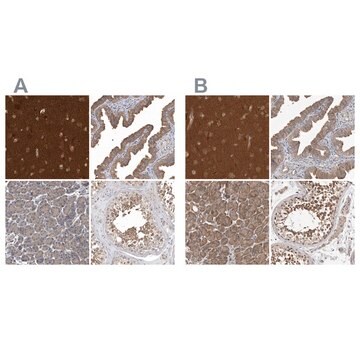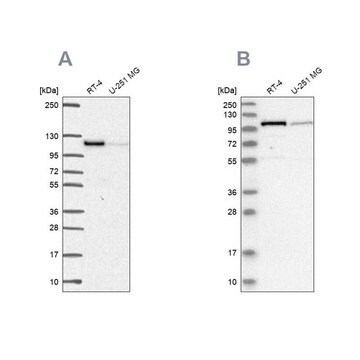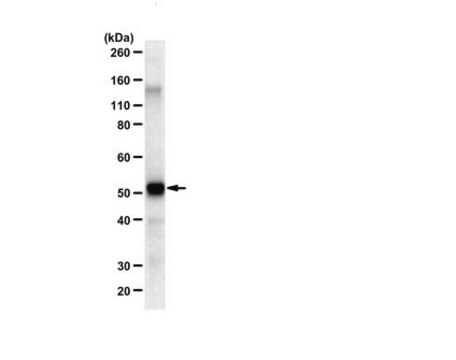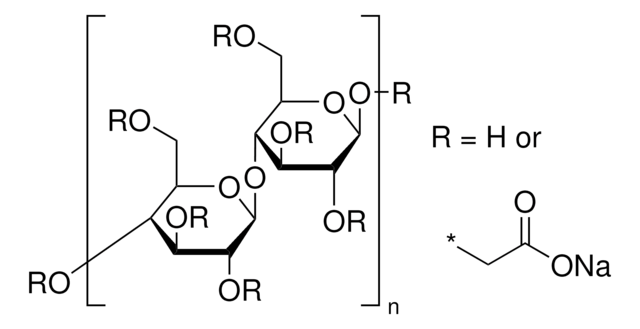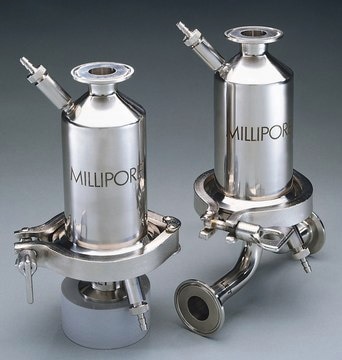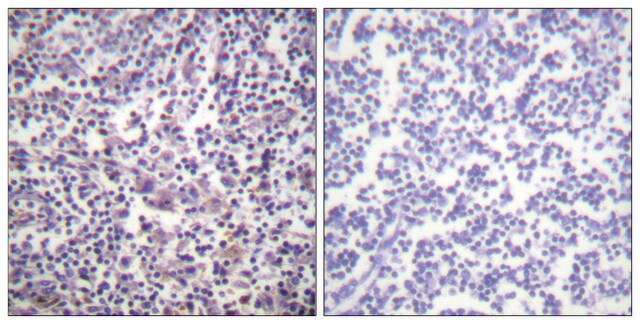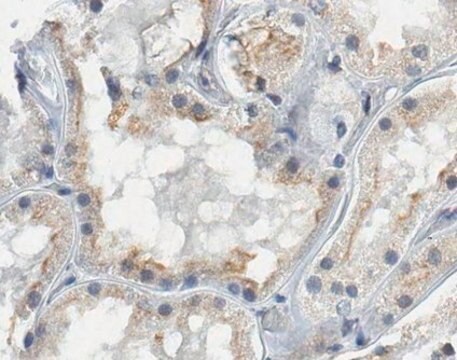推薦產品
生物源
rabbit
品質等級
共軛
unconjugated
抗體表格
affinity isolated antibody
抗體產品種類
primary antibodies
無性繁殖
polyclonal
產品線
Prestige Antibodies® Powered by Atlas Antibodies
形狀
buffered aqueous glycerol solution
物種活性
human
加強驗證
orthogonal RNAseq
independent
Learn more about Antibody Enhanced Validation
技術
immunoblotting: 0.04-0.4 μg/mL
immunohistochemistry: 1:50-1:200
免疫原序列
QTWLDLRELEGKMGERYITHESDDARWEQFAAEHPLPGSGLPTDRDLGGACPPQDHDMQGLAERISVL
UniProt登錄號
運輸包裝
wet ice
儲存溫度
−20°C
目標翻譯後修改
unmodified
基因資訊
human ... PRKD2(25865)
一般說明
PRKD2 (protein kinase D 2) is a member of calcium/calmodulin-dependent protein kinase superfamily. Phorbol esters effectively activate PRKD2 protein by binding to its two N-terminal cysteine rich domains. The protein is expressed in cytoplasm and nucleus.
免疫原
Serine/threonine-protein kinase D2 recombinant protein epitope signature tag (PrEST)
應用
All Prestige Antibodies Powered by Atlas Antibodies are developed and validated by the Human Protein Atlas (HPA) project and as a result, are supported by the most extensive characterization in the industry.
The Human Protein Atlas project can be subdivided into three efforts: Human Tissue Atlas, Cancer Atlas, and Human Cell Atlas. The antibodies that have been generated in support of the Tissue and Cancer Atlas projects have been tested by immunohistochemistry against hundreds of normal and disease tissues and through the recent efforts of the Human Cell Atlas project, many have been characterized by immunofluorescence to map the human proteome not only at the tissue level but now at the subcellular level. These images and the collection of this vast data set can be viewed on the Human Protein Atlas (HPA) site by clicking on the Image Gallery link. We also provide Prestige Antibodies® protocols and other useful information.
The Human Protein Atlas project can be subdivided into three efforts: Human Tissue Atlas, Cancer Atlas, and Human Cell Atlas. The antibodies that have been generated in support of the Tissue and Cancer Atlas projects have been tested by immunohistochemistry against hundreds of normal and disease tissues and through the recent efforts of the Human Cell Atlas project, many have been characterized by immunofluorescence to map the human proteome not only at the tissue level but now at the subcellular level. These images and the collection of this vast data set can be viewed on the Human Protein Atlas (HPA) site by clicking on the Image Gallery link. We also provide Prestige Antibodies® protocols and other useful information.
生化/生理作用
PRKD2 (protein kinase D 2) acts as a potential effector of GABPs in hematopoietic stem cells (HSCs) and mediates the transformation of HSCs by BCR (breakpoint cluster region) - ABL (Abelson) tyrosine kinase oncogene that results in CML (chronic myelogenous leukemia). The protein is considered to be a unique element of signal transduction pathway initiated by phorbol esters and the CCKB/gastrin receptor.
In gastrointestinal tumors and gliomblastomas PRK2 (protein kinase D 2) controls the communication between tumor cells and endothelial cells. PRK2 gets activated by various stimuli such as hypoxia, reactive oxygen species and receptor tyrosine kinases. In human cancers, PRKD2 actively participate in dedifferentiation, survival, formation of new blood vessels and invasion.
In gastrointestinal tumors and gliomblastomas PRK2 (protein kinase D 2) controls the communication between tumor cells and endothelial cells. PRK2 gets activated by various stimuli such as hypoxia, reactive oxygen species and receptor tyrosine kinases. In human cancers, PRKD2 actively participate in dedifferentiation, survival, formation of new blood vessels and invasion.
特點和優勢
Prestige Antibodies® are highly characterized and extensively validated antibodies with the added benefit of all available characterization data for each target being accessible via the Human Protein Atlas portal linked just below the product name at the top of this page. The uniqueness and low cross-reactivity of the Prestige Antibodies® to other proteins are due to a thorough selection of antigen regions, affinity purification, and stringent selection. Prestige antigen controls are available for every corresponding Prestige Antibody and can be found in the linkage section.
Every Prestige Antibody is tested in the following ways:
Every Prestige Antibody is tested in the following ways:
- IHC tissue array of 44 normal human tissues and 20 of the most common cancer type tissues.
- Protein array of 364 human recombinant protein fragments.
聯結
Corresponding Antigen APREST74594
外觀
Solution in phosphate-buffered saline, pH 7.2, containing 40% glycerol and 0.02% sodium azide
法律資訊
Prestige Antibodies is a registered trademark of Merck KGaA, Darmstadt, Germany
免責聲明
Unless otherwise stated in our catalog or other company documentation accompanying the product(s), our products are intended for research use only and are not to be used for any other purpose, which includes but is not limited to, unauthorized commercial uses, in vitro diagnostic uses, ex vivo or in vivo therapeutic uses or any type of consumption or application to humans or animals.
未找到適合的產品?
試用我們的產品選擇工具.
儲存類別代碼
10 - Combustible liquids
水污染物質分類(WGK)
WGK 1
閃點(°F)
Not applicable
閃點(°C)
Not applicable
Zhong-Fa Yang et al.
Proceedings of the National Academy of Sciences of the United States of America, 110(6), 2312-2317 (2013-01-25)
Hematopoietic stem cells (HSCs) are the source of all blood lineages, and HSCs must balance quiescence, self-renewal, and differentiation to meet lifelong needs for blood cell development. Transformation of HSCs by the breakpoint cluster region-ABL tyrosine kinase (BCR-ABL) oncogene causes
Eva Bernhart et al.
Neuro-oncology, 16(7), 933-945 (2014-01-28)
Glioblastoma multiforme (GBM) is a highly aggressive tumor of the central nervous system with a dismal prognosis for affected patients. Aberrant protein kinase C (PKC) signaling has been implicated in gliomagenesis, and a member of the PKC-activated protein kinase D
Sabine Sturany et al.
The Journal of biological chemistry, 277(33), 29431-29436 (2002-06-12)
Recently, we cloned a novel serine/threonine kinase termed protein kinase D2 (PKD2). PKD2 can be activated by phorbol esters both in vivo and in vitro but also by gastrin via the cholecystokinin/CCK(B) receptor in human gastric cancer cells stably transfected
S Sturany et al.
The Journal of biological chemistry, 276(5), 3310-3318 (2000-11-04)
We have isolated the full-length cDNA of a novel human serine threonine protein kinase gene. The deduced protein sequence contains two cysteine-rich motifs at the N terminus, a pleckstrin homology domain, and a catalytic domain containing all the characteristic sequence
J von Blume et al.
The EMBO journal, 26(22), 4619-4633 (2007-10-27)
Protein kinase D2 (PKD2), a member of the PKD family of serine/threonine kinases, is localized in various subcellular compartments including the nucleus where the kinase accumulates upon activation of G-protein-coupled receptors. We define three critical post-translational modifications required for nuclear
我們的科學家團隊在所有研究領域都有豐富的經驗,包括生命科學、材料科學、化學合成、色譜、分析等.
聯絡技術服務
